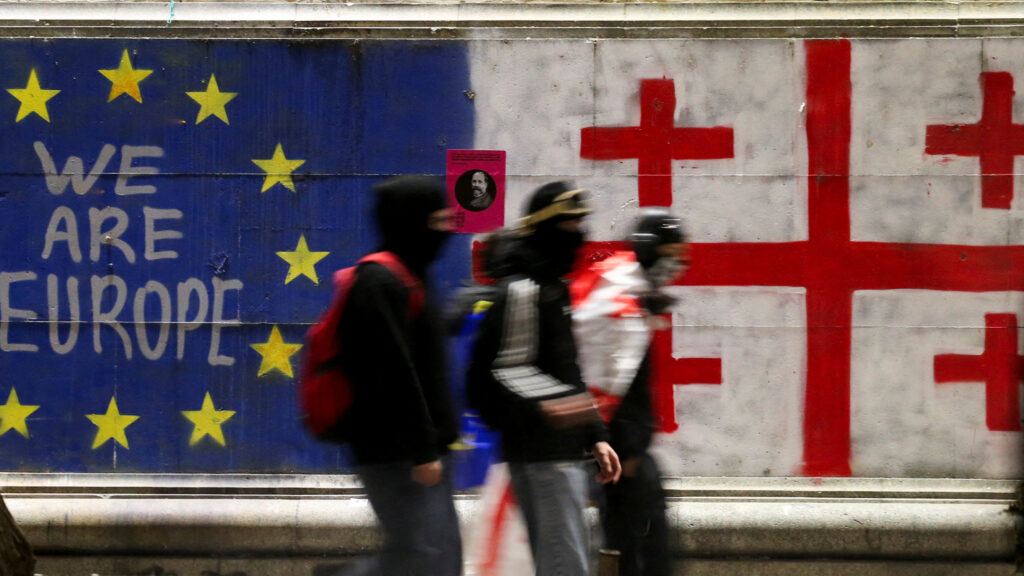Relations between Georgia and the European Union have become increasingly strained over the last few years, as the Georgian government has taken steps that have placed the country’s longstanding commitment to Euro-Atlantic integration in doubt.
Tensions in the already polarized Georgian political and civic space grew sharply in 2024 when the governing Georgian Dream party adopted legislation targeting the country’s civil society. The Georgian government claimed this so-called Foreign Agents law was inspired by the US Foreign Agents Registration Act. However, critics argued that it closely resembled similar Russian legislation, with measures that included imposing a “foreign influence” label on all NGOs receiving funding from foreign partners, irrespective of their activities.
Since the first draft of Georgia’s Foreign Agents law was presented in 2023, it has faced widespread criticism from the international community. The ODIHR, the Venice Commission, the US State Department, and the European Commission have all found it contrary to international human rights standards. It should be noted that the Georgian authorities withdrew the initial draft in 2023, which played a key role in the EU Commission’s decision to grant Georgia EU candidate status. However, the legislation was subsequently adopted in 2024. Georgia’s EU candidate status has since been frozen.
The Foreign Agents initiative of 2024 was accompanied by an aggressive government campaign to discredit Georgia’s civil society and brand them as unpatriotic. While scrutiny and transparency are necessary elements of any vibrant democracy, the tone adopted by the Georgian authorities has sparked considerable alarm.
Stay updated
As the world watches the Russian invasion of Ukraine unfold, UkraineAlert delivers the best Atlantic Council expert insight and analysis on Ukraine twice a week directly to your inbox.
The Foreign Agents law is one aspect of a broader geopolitical drama that has been underway in Georgia in recent years. This trend has accelerated since 2022 as a result of Russia’s war against Ukraine.
On the international stage, the Georgian authorities have consistently condemned Russia’s violation of Ukraine’s territorial integrity. Georgia’s stance is understandable, as 20 percent of this small country of three million is still occupied by Moscow proxies following the 2008 Russian-Georgian War. In parallel, however, there has also been an escalation in the Georgian government’s anti-Western rhetoric. This has included claims that a so-called “Global War Party” is intent on dragging Georgia into a new war with Russia.
Political tensions escalated in late 2024 around the country’s parliamentary elections. The vote was marked by widespread allegations of electoral fraud from opposition forces, leading to months of ongoing street protests and a refusal by the opposition to take their seats in the new parliament.
This has resulted in a Georgian parliament that now functions without an opposition, and a Georgian government that is increasingly isolated from EU institutions and most individual EU member countries. Meanwhile, the Georgian authorities continue to adopt restrictive measures targeting the country’s political opposition and civil society activists, who now face heavy fines and intimidation amid increasing accusations of human rights violations.
Eurasia Center events

Is there any way to lower the political and social tensions in today’s Georgia? The path forward may be narrow, but it is worth pursuing.
The country is scheduled to hold local elections in October 2025. This will include voting in the capital Tbilisi, which will potentially have a significant impact on the national political landscape.
At present, some opposition parties are considering a general boycott of the coming vote. I would strongly urge them to participate. History shows that abandoning institutions to the ruling party rarely helps opposition movements to make their case or raise public awareness about their positions.
At the same time, the current authorities should resist the temptation to declare victory or create conditions that would push the opposition to stay away. While such an outcome may offer Georgian Dream a short-term advantage, it would do little to serve the long-term interests of Georgia and its citizens.
Instead, Georgia’s ruling party should demonstrate its readiness for renewed dialogue with the political opposition and with the country’s civil society. As a first step, the government could immediately invite credible international organizations to observe the local elections. Further steps could include signaling a willingness to scrap the Foreign Agents law and roll back recent restrictions on the right to peaceful assembly.
When it comes to staging elections and upholding democratic norms, the ruling party carries a special responsibility to engage with the opposition and wider society. While the Georgian government’s focus on maintaining peace with Russia may be understandable, the current authorities must not lose sight of the need to make peace at home as well. After all, governments represent all their citizens, not just those who voted for them.
Given that trust among Georgia’s different political forces is currently in short supply, the European Union should step up and declare its readiness to help facilitate dialogue. These efforts could focus on implementing ODIHR’s electoral recommendations to ensure the broadest and fairest possible participation in the upcoming vote.
As a gesture of trust and goodwill, the EU could offer to reverse the suspension of the visa-free regime for diplomats and officials that was introduced last year. This could be contingent on the Georgian government also taking steps to deescalate the current crisis.
It is important to recognize that previous efforts at dialogue have fallen short. It is also crucial to acknowledge that emotions are currently running high. Both Georgia and Europe could benefit from a more constructive approach to mending bilateral ties. If the Georgian authorities ultimately reject the idea of deescalation, this would at least provide the EU with greater clarity moving forward.
The people of Georgia continue to overwhelmingly support the country’s EU and Euro-Atlantic aspirations, as well as the reforms needed to build a free and prosperous society. It is our shared responsibility to exhaust every avenue to ensure we do not disappoint them.
Matteo Mecacci is the former director of the OSCE Office for Democratic Institutions and Human Rights.
Further reading
The views expressed in UkraineAlert are solely those of the authors and do not necessarily reflect the views of the Atlantic Council, its staff, or its supporters.

The Eurasia Center’s mission is to enhance transatlantic cooperation in promoting stability, democratic values, and prosperity in Eurasia, from Eastern Europe and Turkey in the West to the Caucasus, Russia, and Central Asia in the East.
Follow us on social media
and support our work
Image: Supporters of Georgia's opposition parties walk past a wall painted with the flag of the European Union (with a sign) and the Georgian flag during a protest against the government's decision to suspend talks on joining the European Union in Tbilisi, Georgia. December 8, 2024. (REUTERS/Irakli Gedenidze)





